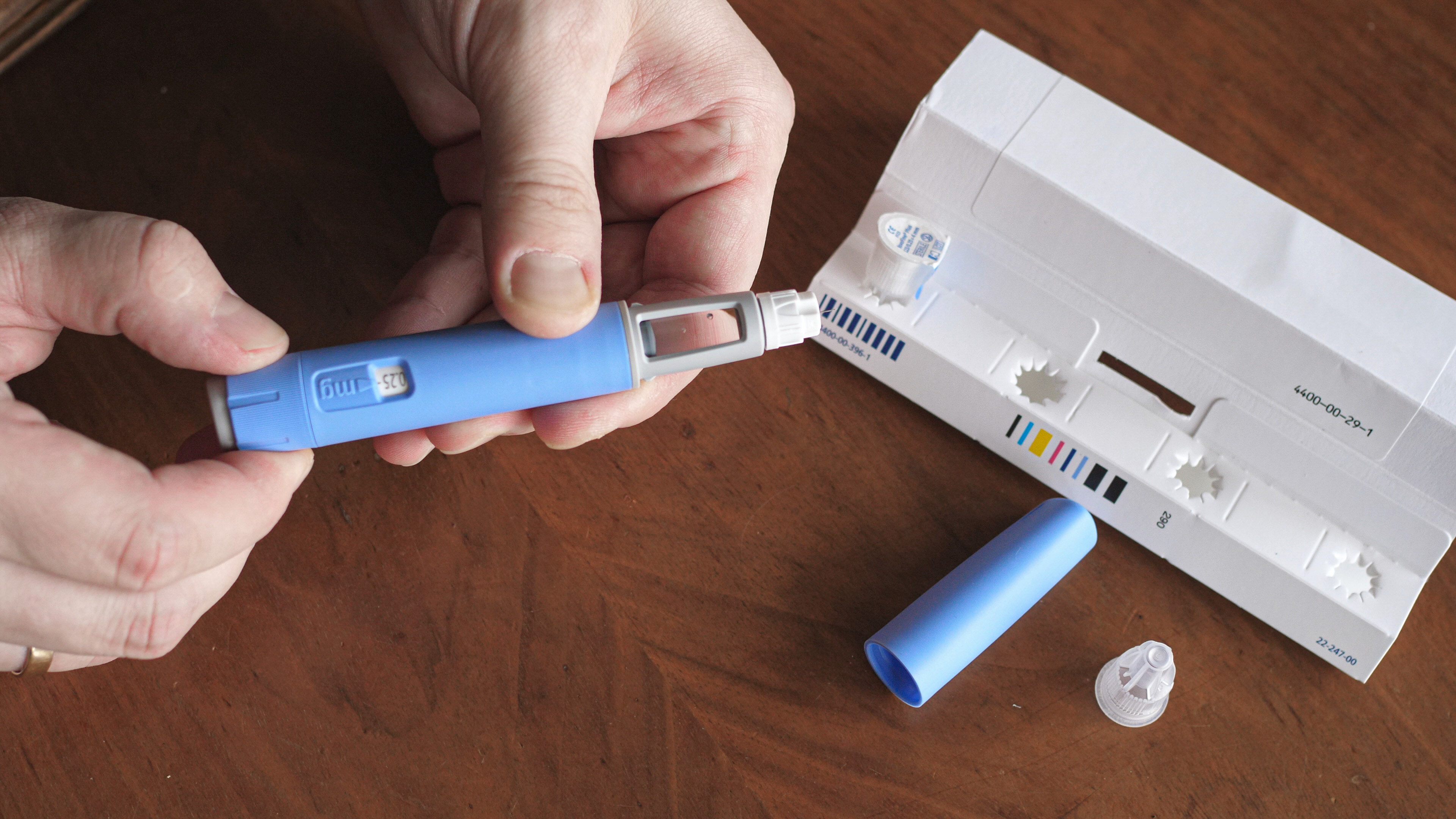Topiramate (Topamax) for Weight Loss: Uses and Precautions
Key takeaways
- Topamax isn’t officially a weight-loss drug, but providers may prescribe it off-label because people often lose weight while taking it.
- It likely works by curbing appetite and helping you eat less, though the exact way it influences weight isn’t fully clear
- Weight loss results while taking Topamax can vary and it’s not a standalone solution for weight loss — pairing it with healthy habits and medical guidance matters.
With so many new weight loss medications making headlines, it’s easy to feel overwhelmed about where to start. One option you may not have heard much about is Topamax (topiramate)—a medication originally used to treat seizures and migraines that has also helped some people lose weight.
While Topamax isn’t officially approved for weight loss, healthcare providers may prescribe it off-label when they believe it could help support someone’s goals. In this article, we’ll break down how topiramate may influence weight, what results people typically see, and the key things to know before deciding if it’s the right fit for you.
What is topiramate (Topamax)?
Topiramate (sold under the brand name Topamax) is an anticonvulsant medication. It's prescribed to treat tonic-clonic and partial-onset seizures and epilepsy. It is also used for migraine prevention in adults and children over 12.
In addition to these uses, topiramate is currently being studied for its efficacy in treating alcohol use disorder (alcoholism), post-traumatic stress disorder (PTSD), bipolar disorder, and certain eating disorders—namely, binge eating.
Topiramate primarily acts on the body’s central nervous system (CNS). While it's not entirely understood how topiramate works, it is thought to help treat seizures and migraines by calming down nerve signals and channels in the brain.
Topiramate’s effect on migraines is preventative rather than therapeutic. Topiramate does not reduce pain or migraine symptoms as they are occurring. Instead, it helps dampen specific triggers that can cause migraines.
Topiramate comes in the form of an oral capsule (regular or extended-release) or a fine powder to be sprinkled on food.
How does topiramate for weight loss work?
Alongside its anti-epileptic properties, topiramate has been shown to cause weight loss in some patients. The exact way that it does so is not fully understood. However, the off-label use of topiramate has been studied in several clinical trials. In multiple tests, topiramate produced more significant weight loss in individuals who took the medication than those in the placebo group.
Some possible mechanisms include appetite suppression (reduced calorie intake), preventing the body from storing excess fat, and lowering some fat and cholesterol levels. It might also affect the brain's reward system, potentially preventing binge eating.
Topiramate may also influence a hormone called leptin, which plays a role in fat storage. Some studies have found that topiramate can lower leptin levels, which may contribute to weight loss.
Additionally, topiramate may affect genes related to neuropeptide Y, which can influence the body's weight regulation system. Moreover, topiramate may work by blocking a substance called carbonic anhydrase that affects how the body metabolizes sugar and lipids (fat cells).
Overall, topiramate has various effects on the body's metabolism and weight management. It can lead to weight loss, lower blood glucose levels, and improve cholesterol and triglyceride levels.
Is topiramate safe?
Topiramate is considered safe and effective for most adults and children over 12. However, it may cause adverse side effects in some patients.
The most common side effects of topiramate include numbness, tingling (paresthesia), slowed reactions, nervousness, headache, drowsiness, weakness, shaking, eye movements, weight loss, digestive problems (constipation, nausea, stomach pain), altered taste, dry mouth, nosebleeds, and menstrual irregularities.
Topiramate can cause dizziness and impair coordination. Avoid alcohol and other central nervous system (CNS) depressants, such as sedatives and certain pain medications, as they can increase these side effects.
Serious side effects are rare but may include:
- Skin issues (rash, blisters, peeling)
- Vision problems (blurred vision, loss of vision, double vision, eye pain, redness)
- Seizures
- Feeling cold, chills, or a low body temperature
- Cognitive issues (difficulty concentrating, speech problems, confusion, memory problems)
- Coma (loss of consciousness)
- Coordination problems
- Heart-related symptoms (pounding or irregular heartbeat, chest pain, shortness of breath)
- Altered mental state (inability to respond to surroundings or mood changes)
- Tiredness
- Gastrointestinal problems (diarrhea, vomiting, loss of appetite)
- Kidney issues (intense back or side pain, abnormal urine)
- Frequent urination, pain while urinating
- Signs of infection (fever)
- Bleeding or bruising problems
- Osteoporosis
In general, higher doses of topiramate are associated with an increased risk of adverse reactions. If you begin to notice the side effects of topiramate, seek medical advice from a licensed healthcare provider.
What precautions should I take before taking topiramate?
Before starting treatment with topiramate, tell your provider about any medical conditions you have, any medications or supplements you are taking, and any adverse reactions to medicines in the past. Topiramate may reduce the efficacy of certain medications, such as birth control pills.
Topiramate may be unsafe for certain individuals with previously diagnosed health conditions.
Healthcare providers may avoid prescribing topiramate for individuals with:
- A history of suicidal thoughts or behaviors
- A history of kidney stones
- Metabolic acidosis
- Bone conditions like osteopenia, osteomalacia, or osteoporosis
- Glaucoma
- Respiratory issues like asthma or COPD
- Depression or mood disorders
- Growth problems
- Thyroid disease
- Liver disease
- Kidney diseases
Topiramate can increase the risk of kidney stones, so it's essential to stay well-hydrated while taking the medication. Drink plenty of water, and consider discussing with your health care provider whether you should take supplements like potassium citrate to reduce the risk of kidney stones.
Tell your provider if you are following a ketogenic diet (a high-fat, low-carbohydrate diet that is used to control seizures), as taking topiramate while on a keto diet can increase your risk of metabolic acidosis.
Topiramate may not be prescribed to pregnant women, women who are trying to conceive, or women who are breastfeeding.
What’s the best topiramate dosage for weight loss?
Topamax—the commonly prescribed brand of topiramate—is supplied as an oral tablet in 25, 50, 100, and 200 milligrams (mg) doses. No standard dosage is recommended because Topamax is not approved as a weight loss aid.
Standard starting doses can range from 25 to 50 milligrams per day and may be increased to 100 milligrams or more. However, individual responses to the medication can vary, and your healthcare provider will determine the appropriate dosage for you based on your medical history and other factors.
If you have been prescribed Topamax, inform your healthcare provider if you begin to experience side effects. Your provider may reduce your dosage or prescribe an alternative treatment option in this event.
Who should take topiramate for weight loss?
Topiramate is FDA-approved as a treatment for epilepsy and certain types of seizures. It is also approved as a preventative measure against migraines in adults and children over 12. The use of topiramate as a weight reduction agent is off-label, meaning that this effect is not FDA-approved.
In general, higher doses of Topamax—the brand name prescription drug that contains topiramate—are shown to produce more significant effects on body weight. More potent doses of the medication, however, are also linked to an increased risk of side effects.
Talk to your healthcare provider about whether or not topiramate is right for you and your condition.
Are there alternatives to topiramate?
Topiramate is one of many prescription drugs currently being used for weight management. However, topiramate is FDA-approved to treat seizures and epilepsy, primarily. It is most effective for weight loss at higher doses, which can increase the risk of adverse side effects. If you are looking for an alternative to topiramate, talk to your doctor about:
Semaglutide (available as Ozempic, Wegovy, or Rybelsus): Semaglutide is a diabetes drug that assists with weight loss when prescribed with a healthy diet and regular exercise. Semaglutide works by managing blood sugar levels, curbing appetite, and slowing stomach emptying (which makes you feel fuller longer). Wegovy, a brand-name medication containing semaglutide, is specifically approved for the treatment of obesity in patients without type 2 diabetes.
Tirzepatide (available as Mounjaro or Zepbound): Like semaglutide, tirzepatide is a GLP-1 receptor agonist used to treat type 2 diabetes and obesity. It regulates blood sugar levels, reduces appetite, and slows stomach emptying. Zepbound, a brand name containing tirzepatide, is specifically approved to treat obesity in patients without type 2 diabetes.
Liraglutide (available as Saxenda): Liraglutide is a GLP-1 receptor agonist approved by the FDA to treat obesity in adults and children over 12. It works by reducing blood sugar levels and appetite while slowing stomach emptying.
Naltrexone/bupropion (available as Contrave): Bupropion helps reduce appetite and increase the feeling of fullness, making it easier to control calorie intake. Naltrexone works as an opioid receptor antagonist, which can reduce the rewarding effects of food and cravings, particularly for high-calorie, high-sugar foods. Contrave is FDA-approved as a weight management aid for patients with obesity or individuals who are overweight and have a weight-related health condition.
Metformin: Metformin is a prescription diabetes drug that has been shown to cause weight loss in some patients. It works by regulating blood sugar levels and improving insulin sensitivity. Increased insulin usage lowers the amount of sugar circulating in the blood.
Talk to your provider about Qsymia (topiramate/ phentermine) if you want a more targeted topiramate treatment option.
What is the difference between Topamax and Qsymia?
Topamax is a brand-name prescription medication approved to treat epilepsy and certain types of seizures and prevent migraines. Qsymia contains the active compound in Topamax—topiramate—combined with phentermine, an appetite suppressant. Unlike Topamax, Qsymia is an FDA-approved weight management medication.
Qsymia is indicated for use in adults with obesity (with a body mass index—BMI—of 30 kg/m2 or greater) or overweight adults (with a BMI of 27 kg/m2 or greater) who also have weight-related medical problems such as type 2 diabetes, high blood pressure, high cholesterol, or cardiovascular disease.
Qsymia is prescribed as an extended-release oral capsule. It is generally taken once a day, usually in the morning. Healthcare providers will prescribe a low dose of Qsymia before gradually increasing its dosage, depending on how the patient tolerates the medication. It is prescribed with lifestyle changes such as a reduced-calorie diet and increased exercise.
It is important to note that Qsymia has been shown to cause adverse effects. It may increase the risk of congenital disabilities if taken while pregnant. Qsymia is not appropriate for every patient seeking to manage their weight. For more information about Qsymia, talk to your healthcare provider about its benefits and potential risks.
How do I get a prescription for weight loss drugs?
Topiramate—sold under the brand name Topamax or in its generic form—is a prescription drug, meaning that you must have a written order from a licensed healthcare provider to get it. You cannot buy generic topiramate or Topamax over the counter.
Weight loss drugs are prescribed to individuals with obesity or individuals who are overweight and managing a weight-related health condition. If you are curious about Topamax or any other weight loss drug, talk to your healthcare provider about whether or not these treatment options are right for you. This is also an excellent time to discuss costs, potential side effects, and concerns.
Can I get Topamax on Sesame?
Sesame offers an affordable and comprehensive online weight loss program to help you get started on your weight loss journey. Success by Sesame is a month-to-month subscription that includes a video consultation with a weight loss doctor or specialist of your choice, access to prescriptions for weight loss medication like Topamax if appropriate, unlimited messaging with your provider, ongoing support, and more.
Maintaining a healthy weight can lead to significant health benefits, including a lower risk of heart disease, improved mobility, better sleep, and enhanced overall well-being. Get started on your weight loss journey today. Note that all prescriptions are at the discretion of your healthcare provider.






